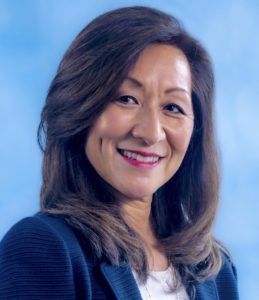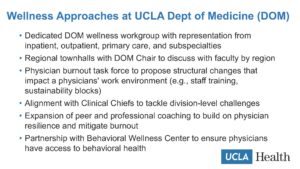
As pressures on physicians intensify from health care institutions, insurance companies and patients — amidst the ongoing stress of the COVID-19 pandemic — it’s no wonder that increasing numbers are feeling burned out. But physicians and organizations can take practical steps to reduce burnout and promote wellness, according to Lin Chang, MD, AGAF, professor of medicine at the David Geffen School of Medicine at UCLA, who spoke on the topic during Digestive Disease Week® (DDW) 2022.
“We can’t always change the stressors in our environment,” said Dr. Chang. “But we can change the way we manage and respond to stress. Building resilience can enable us to adapt to adversity and stressful events in a more positive way.”
Many causes of physician burnout are distractions that take them away from patients or hinder their ability to provide quality care. “Physicians are really motivated by meeting the needs of their patients and feeling valued and appreciated,” Dr. Chang said. “In today’s health care environment, however, we also have to focus on how our actions contribute to our pay and to the hospital’s bottom line. These two forces are not always in sync and can cause a lot of stress.”
For example, much of a physician’s time is dedicated to administrative work — filling out electronic medical records, writing up clinical notes, focusing on relative value units and dealing with insurance companies during peer-to-peer reviews or prior authorizations.
Dr. Chang outlined multiple ways that both individuals and organizations can mitigate physician burnout:
Individual strategies to address burnout
- Incorporate stress management and self-care into your routine.
- Hone your communication skills. Complex patients can be draining on your time. Effective communication can help to set expectations with patients, help you manage time more effectively and improve satisfaction of care.
- Be aware of policies that enable you to bill for reviewing medical records and writing up your notes.
- Integrate apps, other technologies and resources for symptom assessments, behavioral treatments and patient education. These not only empower patients to monitor their own health and treatment but also free up physician time.
“As a physician, you can’t be everything to everybody,” Dr. Chang said. “Finding ways to outsource some of your administrative responsibilities to other staff and using technology more effectively can help you focus on your patient.”
Organizational strategies to address burnout
- Consider physician wellness when developing call schedules and shifts.
- Keep lines of communication open. Give feedback to physicians and provide ways for them to communicate their concerns.
- Consider ways to decrease the burden of electronic medical records. Scribes or allied health personnel can alleviate some of this burden from physicians.
- Find ways to show appreciation and gratitude.
- Create more integrated care systems for chronic conditions. Providing access to specialists such as dieticians and psychologists not only helps patients but also relieves gastroenterologists from trying to do it all.
- Offer wellness and psychological services to physicians and ensure they know how to access them.
“Burnout is complex and different for everyone,” Dr. Chang stressed. “There might be certain themes — like prioritizing communication and protecting your time — but there’s no one-size-fits-all solution.”
Dr. Chang will give the oral presentation, “Practical strategies for mitigating burnout: Moving from burnout to wellness,” on Tuesday, May 24, at 4:50 p.m. PDT as part of the session “Caring for the Caregivers: Recognizing and Addressing Physician Burnout.”





One Response
Similar burnout may be applied to basic biomedical researchers in academic institutions.